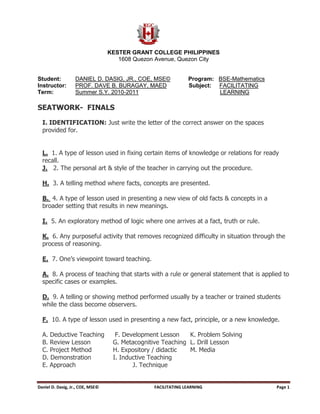
Facilitating learning final answers
- 1. KESTER GRANT COLLEGE PHILIPPINES 1608 Quezon Avenue, Quezon City Student: DANIEL D. DASIG, JR., COE, MSE© Program: BSE-Mathematics Instructor: PROF. DAVE B. BURAGAY, MAED Subject: FACILITATING Term: Summer S.Y. 2010-2011 LEARNING SEATWORK- FINALS I. IDENTIFICATION: Just write the letter of the correct answer on the spaces provided for. L. 1. A type of lesson used in fixing certain items of knowledge or relations for ready recall. J. 2. The personal art & style of the teacher in carrying out the procedure. H. 3. A telling method where facts, concepts are presented. B. 4. A type of lesson used in presenting a new view of old facts & concepts in a broader setting that results in new meanings. I. 5. An exploratory method of logic where one arrives at a fact, truth or rule. K. 6. Any purposeful activity that removes recognized difficulty in situation through the process of reasoning. E. 7. One’s viewpoint toward teaching. A. 8. A process of teaching that starts with a rule or general statement that is applied to specific cases or examples. D. 9. A telling or showing method performed usually by a teacher or trained students while the class become observers. F. 10. A type of lesson used in presenting a new fact, principle, or a new knowledge. A. Deductive Teaching F. Development Lesson K. Problem Solving B. Review Lesson G. Metacognitive Teaching L. Drill Lesson C. Project Method H. Expository / didactic M. Media D. Demonstration I. Inductive Teaching E. Approach J. Technique Daniel D. Dasig, Jr., COE, MSE© FACILITATING LEARNING Page 1
- 2. LONG TEST - FINALS I. TRUE or FALSE TRUE 1. In Metacognitive Teaching, learners are trained to become aware of & exert control over their own learning by using metacognitive processes. TRUE 2. In Inquiry Teaching, learners are confronted with a puzzling situation & are led to enter into investigative work to solve the problem. FALSE 3. In Expository Strategies or Direct Instruction, the Desired Outcomes are development & formulation of concept, principles, attitudes & values. FALSE 4. In Exploratory Strategies or Guided Instruction, the Learning Environments are similar. FALSE 5. One of the characteristics of the Exploratory Strategy is less delivery time. II. ESSAY: Compose a one-paragraph essay with not less than thirty (30) words & must be in brief. (5pts.) each A. In your viewpoint, what is the best approach in Methodology of Teaching the Basic Elementary & High School students? Why? Basic education will serve as the total foundation of the students. They must be filled with theories and academics to prepare them for a life-changing stage which is the college education. As I foresee it, Expository Strategy or didactic method would best apply. With these students’ brackets, they will need tough orientation on how facts, principles and laws are applied by presenting, defining and interpreting by the teacher himself so that knowledge can be internalized by these students. After which testing of the concepts on how they are used to applied be performed to prove that it works by the learners themselves. Daniel D. Dasig, Jr., COE, MSE© FACILITATING LEARNING Page 2
- 3. Meanwhile, this method requires no more time of delivery and as a Teacher-Controlled method, the teacher can directly initiate ways on how students can outperform in the class. After all, it is a facilitator’s promise of instilling values and behavior to the learners as they step atop. B. What effective methodology are you going to use in teaching college men? Why will you use it? Explain in brief. In the light of practice in teaching as my profession to the college men I will apply the Laboratory Method. College education is a life itself not a preparation for life. They must be trained rigorously from theories, laws, policies, rules and guidance or PRG’s to application. This is to depict that with my extensive industry experience, technical know-how seems a major requisite in the workplace. Learners must be injected into the realities of their chosen field. Classroom training must serve as their first hand educational learning ground wherein the learners may investigate a problem, conduct experiments, observe processes, or apply theories & principles in a simulated setting. Laboratory activities will cultivate students’ skills in the basic and advanced learning, enhance higher order of critical thinking skills, induct learners into scientific processes, enrich and unleash their skills that will be cultivated in the real World of Work. Daniel D. Dasig, Jr., COE, MSE© FACILITATING LEARNING Page 3
- 4. C. Why is it that one of the characteristics in Exploratory Strategy is the Facilitative Method? Explain further. Exploratory Strategy is a teaching strategy which aims to formulate concepts, principles, skills, attitudes & values and the like. To attain these aims, it uses facilitative method which encourages more active participation of the learners through inquiry teaching, inductive process and even teacher facilitative method. From a certain knowledge, the learners can generate another area of the knowledge discussed, arrived certain facts, principles and laws may deem necessary to apply. Acquisition of knowledge and details with differences and commonalities of an entities or element concern may form definition of rules, conclusion, and generalization. At first, learners are active while the subject matter are presented and they become much more interactive as part of the learning body. The open line of communication by defined and set media is observed however respect prevails at all times. An idea presented by each learner is consider while exploring the truth behind inquiries. Exploratory strategy uses facilitative method to maximize the innate critical thinking skills of learners to acquire general acceptable knowledge as contribution to the learning curve of each learner. Daniel D. Dasig, Jr., COE, MSE© FACILITATING LEARNING Page 4